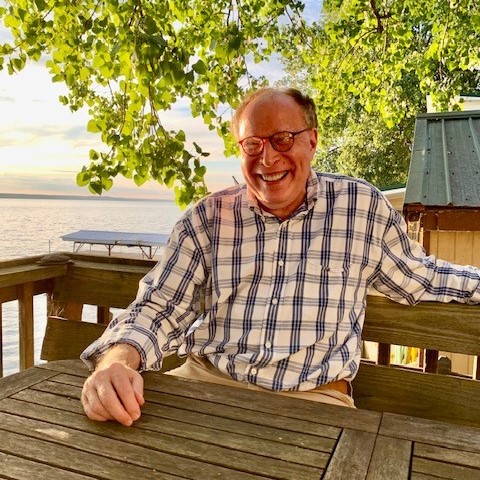Bob was a vibrant 40-year-old teaching health care administration when, one day, he noticed a small lump under his nipple. He had no known family history of breast cancer, and while he found the lump unusual, he did not actively worry until his nipple started bleeding. He scheduled an appointment with his family doctor. Bob was quickly referred to a surgeon and was subsequently diagnosed with stage 2 breast cancer.
He was shocked. Less than 1% of new breast cancer cases each year are in men. Whenever Bob shared his diagnosis with others, their mouths would drop open, almost in disbelief.
Bob underwent a mastectomy and then received chemotherapy and tamoxifen. Fortunately, he did not suffer from a lot of side effects and was able to work through most of his treatment. Bob was particularly grateful for effective drugs to help manage his nausea, a common side effect of treatment. “My biggest side effect was fatigue. So if I wanted to sleep, if I needed to sleep, I’d just go to sleep.”
During treatment, his main support system consisted of his friends as well as his sister, who flew in for his surgery. Eventually, Bob also joined a breast cancer support group. At the time, he was the only man involved in the Ithaca Breast Cancer Alliance, now called the Cancer Resource Center of the Finger Lakes. He helped form a breakfast club for men with all types of cancer, where the members can share their experiences, stories, and advice. “We have professors and firefighters and farmers and just all kinds of people. Half the time, we don’t even talk about cancer, but we are there for new people. We like the sense of community, and it has been really very helpful.”
When Bob’s treatment ended, he didn’t know what to do next. “You get this kind of post-treatment funk. Because when you’re in treatment, you see the same doctors and nurses and therapists all the time, and you feel safe. When you finish treatment, they pat you on the back and say ‘Bob, you did great, we’ll see you in three months.’” The feeling was unsettling for him as he transitioned from active treatment to cancer monitoring. Talking to others in his support groups helped him realize that he was not alone in his struggles.
In response to his cancer diagnosis, Bob became much more focused on the present day and the next year or two. Instead of focusing on his 20-year plan, he wanted to live in the moment, and he chose to live one day at a time, one moment at a time. “I think that’s good for all of us, in a sense, to focus on the present.”
Bob also decided to change careers. While he enjoyed his job teaching, he decided to become more involved in the cancer community. Initially, Bob had joined the Ithaca Breast Cancer Alliance to find people he could relate to, but he ended up working with the alliance professionally for a number of years.
In 2021, Bob was diagnosed with prostate cancer and was followed with active surveillance for several months until testing revealed progression. He then received external beam radiation therapy.
When diagnosed with breast cancer in 1996, genetic testing was not routine, and Bob wasn’t tested at that time. After the prostate cancer diagnosis, however, he did undergo genetic testing, which revealed that he had a CHEK2 mutation.
Bob has now spent over 25 years involved in the cancer community – in local cancer support organizations, participating in support groups, providing one-on-one support for those recently diagnosed with cancer, and speaking on panels to raise awareness of male breast cancer and other cancers. He wrote a regular newspaper column to help others living with cancer. He also focuses on nurturing the next generation of cancer researchers to help them understand the human perspectives of cancer. He brings together cancer researchers and doctoral students at Cornell University with cancer survivors. “My goal is to get them connected to real people with the diseases that they are studying and researching to make real progress.” Bob got the idea to work with and connect researchers and members of the cancer community while he was serving on a research review panel. He noticed that the researchers and advocates were wary of each other, and he felt that it would be more natural if such connections could begin during the students’ professional development.
In addition to helping universities create and develop their own programs to connect researchers to the patient community, he serves as part of the NCI Cancer Community Partnership. He is optimistic about the future and encouraged that treatments are getting better and more precise. Bob urges people to do research and listen to their gut. “There is not one right way through cancer, and you have to be aware of what makes sense for you. I tell people to talk to others and get recommendations, but then listen to what is going through your head at night. That is often very, very helpful.”

Image: Bob
There is not one right way through cancer, and you have to be aware of what makes sense for you. I tell people to talk to others and get recommendations, but then listen to what is going through your head at night. That is often very, very helpful.”

